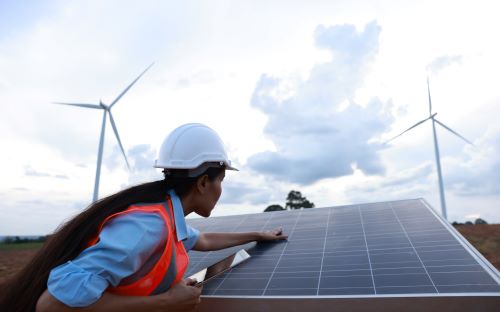Although many Indian businesses celebrate the annual Pride Month aimed at encouraging support for the country’s LGBTQ+ community, there is much work to be done before all Indian workplaces become inclusive spaces where people can be open about their sexuality and gender identity without fear of discrimination.
Features
Time to take Pride: the problems faced by India’s LGBTQ+ employees
Every June, like many global firms, countless Indian corporations switch their logos from their traditional colours to rainbow colours to show their support for Pride month. Rainbow flags decorate workplaces to remind workers of the company’s support for the LGBTQ+ community and to demonstrate that the office is a safe and inclusive space for all workers, regardless of their sexual and gender identity. Several businesses also organise vibrant Pride parades, where thousands gather to express themselves and offer support to the LGBTQ+ community.
Pride Month, which began as a commemoration of the June 1969 Stonewall riots in New York City, during which LGBTQ+ people, tired of oppression, fought back against violent police officers and organised protests seeking to assert the human rights of LGBTQ+ people, was officially recognised in 1999 by President Bill Clinton. And this year marks the 54th anniversary of the first Pride parade, which took place in 1970, a year after the Stonewall uprising.

Decriminalisation of homosexuality
In India, for far too long, most businesses were scared to even acknowledge the LGBTQ+ community, let alone support them, due to fear of alienating their conservative stakeholders and customers. However, arguably, this began to change in 2018, when homosexuality was decriminalised and Section 377 of the Indian Penal Code, which criminalised sex between people of the same gender, was dismissed by the Supreme Court. Ever since, corporate India has begun expressing its solidarity towards the LGBTQ+ community in many different ways e.
In 2019, when ‘coming out’ as LGBTQ+ was still a taboo topic in India, the dairy products giant Amul launched a campaign aimed at supporting and encouraging members of the LGBTQ+ community to celebrate their love for each other. The cooperative, one of the largest milk and milk products businesses globally, released an ad featuring the colours of the rainbow to represent Pride.
Around the same time, youth fashion brand Fastrack shared a picture on its social media platforms supporting the LGBTQ+ community, which read: “The road to equality has never been straight.”
Meanwhile, Tata’s jewellery brand Tanishq, which is largely considered to be a traditional and conservative brand, took the plunge with its advertisement on a social media site that read: “Two of a kind always makes a beautiful pair!”
So, with billion-dollar Indian companies now willing to come out and publicly state their support for both the wider LGBTQ+ community and their LGBTQ+ employees, there is a significant move from businesses to contribute to social pressure for a culture of genuine inclusion for the LGBTQ+ community across every aspect of Indian life, including at work.
Culture of tolerance
However, LGBTQ+ activists say activities to promote a culture of tolerance towards – and celebration of – the LGBTQ community during the annual Pride Month is tokenism and ‘pinkwashing’, as LGBTQ+ people generally feel that the month’s goals of acceptance and celebration of the LGBTQ+ community do not resonate throughout the year and in their daily lives in India, including at work.
Pranav Das, a Delhi-based LGBTQ+ activist, told The Patriot media outlet: “Last year, Archies [the online gift store] introduced Pride greetings to celebrate inclusivity. However, this year, there’s been no follow-up, highlighting how commercial interests often dictate actions. The absence underscores how profit margins can overshadow genuine commitments. This shift serves as a stark reminder of the commercialisation of social causes.”
Meanwhile, Prarthana Prasad, a video content creator and a leading voice from the LGBTQ+ community, told a recent diversity, equity and inclusion (DEI) conclave in Bengaluru how she is often a “token ticket” for corporates, increasingly contacted by brands for promotion during Pride Month.
However, to engage a new generation of workers and consumers, who value diversity and inclusion from their employer and the businesses they purchase goods and services from, companies must move beyond public gestures of support for LGBTQ+ issues to create a more positive work experience.
“Mere public gestures of support, with a few major consumer brands regularly sponsoring annual Pride events, don’t work in the long run,” said one LGBTQ+ activist. “In reality, today’s workplace is falling short of full inclusion.”
Safeguarding LGBTQ+ people at work
The activist added that responsibility for safeguarding LGBTQ+ individuals from discrimination at work falls upon the employer and they must take proactive steps to create safe, supportive and truly inclusive workplaces for their LGBTQ+ employees.
Indeed, research shows LGBTQ+ employees are increasingly prioritising working in businesses where it’s safe to openly be themselves and are actively seeking out companies who live up to their inclusivity standards.
This trend in job search strategies reflects the increasing awareness and demand for workplaces that embrace diversity and foster a sense of belonging, whether it be for LGBTQ+, female, disabled, neurodivergent or older workers.
“With companies making business-critical decisions about recruitment practices, employee-resource groups, and marketing that embrace LGBTQ+ rights, the growing business case for inclusion has not translated into solid gains for the LGBTQ+ community within the workplace itself,” argues Pankaj Arora, a software engineer, who was forced to quit his previous job because of a lack of LGBTQ-inclusive policies.
Arora said that despite the business in question being a large corporate, it surprisingly lacked anti-discrimination policies to protect LGBTQ+ employees from discrimination and support them to be open about their sexual and gender identify. “I had an awful experience and was in for a rude shock to learn that even such large businesses lack policies to protect and safeguard the interests of the members of the LGBTQIA community,” he said.
The company did not have any anti-discrimination policies to protect LGBTQ+ staff, which made him reluctant to be open about his sexual orientation during his short stint there. However, after joining another company that was highly supportive of LGBTQ+ employees, he felt comfortable enough to come out.
He added that LGBTQ+ people regularly experience discrimination in all types of workplaces and businesses, and this contributes to feelings of isolation and has a negatively impact on their workplace experience and working lives.
Higher rates of sexual harassment and discrimination
Unsurprisingly, research has shown that LGBTQ+ people face high rates of sexual harassment and discrimination based on their gender identity and sexual orientation, further deepening their sense of isolation.
According to a survey commissioned by job site Glassdoor, over half (55 per cent) of LGBTQ+ employees report they have experienced or witnessed anti-LGBTQ+ comments by co-workers.
A 2022 study conducted by HR consulting firm Randstad India revealed that 53 per cent of Indian companies do not have career-development opportunities for people from the LGBTQ+ community. It further revealed that only 9.5 pecent of the surveyed organisations have made extremely significant efforts to be LGBTQ+ inclusive.
More recently, a 2023 market study by Careernet Prism, an initiative of Careernet, a talent solutions provider, revealed that many LGBTQ+ employees in India face workplace harassment, discriminatory treatment, and limited job opportunities. The lack of LGBTQ+ representation in the workplace also leads to the neglect of their concerns and grievances.
Despite the presence of a spectrum of sexualities since at least the times of ancient and medieval India, commentators say that Kumar Kalbande’s case demonstrates that the Indian government has failed to properly respect or adequately protect members of the LGBTQ+ community.
Kalbande, a former government employee in Nagpur who is both disabled and a member of LGBTQ+ community, has pleaded for passive euthanasia as a last resort due to “systemic failures to address his suffering”.
Three years ago, the former junior technical assistant at the Forest Survey of India’s Nagpur branch was outed as gay, which led to him being harassed for sexual favours. He has also gone without pay, and lives with a disability that could have been prevented if he had the necessary funds for medical treatment. Hopeless, he has now pleaded for passive euthanasia as he feels no one is listening to his plight or believing that he has faced, and continues to face, homophobic discrimination.
However, commentators say that failing to adopt suitable and appropriate policies to support LGBTQ+ employees is affecting the financial performance of Indian businesses and the country as whole.
Lost GDP due to LGBTQ+ exclusion at work
Indeed, according to a World Bank study conducted in 2014, The Economic Cost of Homophobia and the Exclusion of LGBTQ People: A Case Study of India, up to 1.7 per cent of India’s GDP is lost every year through LGBTQ+ exclusion. The study also found that 56 per cent of LGBTQ+ people reported discrimination in white-collar jobs in the country.
In 2018, the National Human Rights Commission of India reported that 96 per cent of trans people are denied jobs, 92 per cent are denied the right to participate in any form of economic activity, and 18 per cent suffer physical abuse.
An example of the problems faced by trans people in securing employment is illustrated by India’s first trans photojournalist Zoya Thomas Lobo, who does not have a stable job and is therefore forced to beg on Mumbai’s local trains, where she somehow manages to maintain an basic existence.
Without any income, she chooses to beg because she doesn’t want to get exploited by those who target the homeless LGBTQ+ community: “Whatever I am earning, if I can make a decent earning, why not?”, she says.


FEATURES

India’s path to net zero: a work in progress
By Orchie Bandyopadhyay on 08 April 2025
India is implementing a variety of clean energy measures to hit its target of net zero greenhouse gas emissions by 2070, including plans to rapidly scale up the generation of nuclear power. However, climate experts say significant finance will be required from developed countries to phase out coal power, accelerate renewables deployment and expand the national electricity grid.

Too hot to handle: early arrival of heatwaves in India sparks calls for action to protect workers and the public
By Orchie Bandyopadhyay on 08 April 2025
Temperatures in India in February 2025 were the hottest since records began over a century ago, prompting warnings the country needs to urgently step up efforts to protect both workers and the general population from the health risks posed by extreme heat and humidity.

